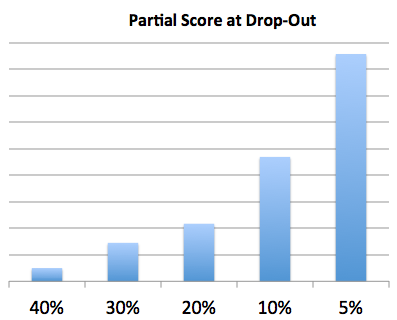 “Nothing spoils a good argument like a few facts”, as my late father taught me. And nowhere could we use a few facts more than in the matter of the myths about screening questions in job applications: the myths and misconceptions are legion!
“Nothing spoils a good argument like a few facts”, as my late father taught me. And nowhere could we use a few facts more than in the matter of the myths about screening questions in job applications: the myths and misconceptions are legion!
Expr3ss! makes extensive use of simple “Yes/No” screening questions. Why?… because resumes are such appalling predictors of success in role. That’s a separate topic that I’ve covered before in “What is a Resume For?“. In a nutshell, resumes are “applicant advertisements”, no more.
“Yes/No” screening questions confer three great advantages. They are straightforward and unequivocal, making the employer think clearly about the criteria for the job and the applicant think clearly about their answers and suitability.
“But you can’t ask too many screening questions”, say the anxious, “you’ll get applicant drop-out”… well, hooray! So which applicants do you imagine drop out the easiest? Who drops out of the Olympic Trials because they couldn’t finish the race? You got it!
“But what about the people who don’t finish”, retort the nail biters, “we might miss someone!” Yes you will… and a very good thing too. This thinking is an example of the “One True Applicant” myth I debunked last month here in “It’s Not a Marriage Proposal” . As long as you get strong competitors, it matters not who falls by the wayside.
So how about some real facts about screening questions?…
- Expr3ss! has recorded 13.8 million answers to screening questions
- The average number of questions answered by each applicant was 33 [Median: 36]
- 86% of Applicants scored more than 90% on their screening questions
- 3.1% of Applicants scored less than 50% on their screening questions
Busted: The myth that applicants will not answer many screening questions is debunked… they will and they do!
Now let’s talk about the drop-outs. I’ll be blunt: that’s exactly what they are by definition… drop-outs. How do we know this? Read on!
We tracked exactly when applicants dropped out of completing their screening questions and the results are startling. Dropping out is totally independent of the number of screening questions. It’s not the quantity of questions that counts, it’s the quality of the answers!
Yes, the actual number of screening questions is not significant. Dropping out is a function of the applicant’s screening question partial score at the moment they drop out. When they know they’re not a contender, they pull out.
Some more real facts not myths…
- The poorer the score the sooner applicants drop out.
- Less than 1% of people dropped out whilst scoring more than 50% at the time
We did some in-depth qualitative follow up of the applicants who dropped out. Many were surprised to hear from us and did not even remember setting out to apply for the job in question.
Of the others, we found that almost none were of sufficient quality to be considered for the role and of those that were, none was actually really interested in the role.
In short, we confirmed that this “self-filtering” removed only unsuitable applicants, leaving a pool of much more suitable applicants who had completed the process fully.
Busted: So the myth that drop-outs are bad is not only busted now we know they’re good!
Our customers tell us that applicants say that the screening questions actually engage them in the process, helping them understand its requirements. It confirms them in their drive to apply and convinces them of the professionalism of the company and its recruitment efforts.
The reality of screening questions is that they are a win-win for applicants and businesses to enhance and streamline recruitment, whilst adding to your employer of choice reputation.
So that’s a big “Yes” for screening questions and lots of ’em!
Thanks for dropping by.
Related posts:
[1] http://blog.expr3ss.com/2012/11/whats-a-resume-for/
[2] http://blog.expr3ss.com/2013/02/its-not-a-marriage-proposal/


I found it difficult when first using Expr3ss! not to look at the resume first. After now using the system I am now confident to go straight to the star rating. Others also using Expr3ss! for the first time may also be having trouble changing their ways. However, if they read this article it will go a long way to assisting them change their attitude.
Thank you for your thoughts and for promoting this change in attitude Michael. Old habits do die hard! Avoiding the bias which is the inevitable result of premature résumé reading helps ensure a more rational and effective selection process.